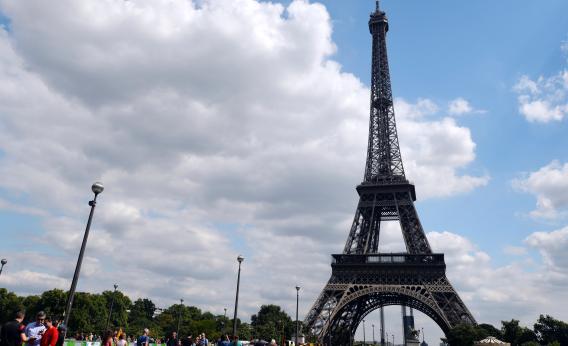The New York Times reports this week on the current state of affairs in Paris, where the tension between locals and tourists is at its summertime peak. Using a quintessential Times sentence structure, journalist Liz Alderman writes, “In the City of Light, an eternal question is once again spurring debate: Is the stereotype of the brusque Frenchman justified, or do visitors just not understand the French?” The Parisian tourism board has reopened this inquiry by releasing a pamphlet for restaurant and hotel workers called “Do You Speak Touriste?” Alderman describes the manual, which is subtitled (in my translation) “The Guide for Getting to Know Foreign Tourists Better,” as part of “a charm offensive to burnish the image of France—and Paris in particular—as a kinder place for tourists.”
But if this is a charm offensive, I’d hate to see the Parisian tourist board at its rudest. “Do You Speak Touriste?” is proof that Parisians—the ones in the tourism office, anyway—aren’t afraid to make vast, gross, occasionally offensive generalizations about people based solely on their nationality.
“Do You Speak Touriste?” is divided into 11 sections, each one about tourists from a different country: France, Belgium, the Netherlands, Great Britain, Germany, Spain, Italy, the U.S., Brazil, China, and Japan. (Why is France included, you wonder? The French wonder that too: According to the guide, “The French don’t want to be thought of as tourists.”) The section for each set of countrymen contains, among other information, a phrase explaining “what Paris evokes for them,” a two- or three-word summary of their general proclivities, their ostensible expectations (Belgians, e.g., expect “innovative offers tied to new technologies”), and what “they most particularly like” (for Brits, this category includes amusement parks and sporting events).
Inevitably, the guide ends up reiterating a lot of tired stereotypes. Germans, for instance, have “a need for consistency.” The Japanese expect cleanliness. Brazilians like going out at night. Italians are impatient. The Chinese value “luxury shopping above all.” Surprisingly, there’s nothing about Brits having bad teeth or Americans being obese, but perhaps they’ll make those updates in the next edition.
In addition to the caricatures, “Do You Speak Touriste?” makes a few bewildering, sweeping statements about the citizens of different countries. Did you know, for instance, that Brazilians “appreciate the availability of wifi connections”? That the Spanish expect to be offered activities that they can do with their families? Or that Italians “will be very touched if you devote a little attention to their children” and “are very sensitive to the elegance of professional uniforms”? The Parisian tourism board is here to help you determine the deep-seated desires and psychological needs of anyone, just by looking at their passport!
Of course it’s good for people working in hospitality to be conscious of cultural differences, and of course there are some quantifiable dissimilarities between the average American and the average Italian, say. But “Do You Speak Touriste?” crosses the line between empirical observation and wild overgeneralization. If the Parisian tourism board’s goal is to combat the stereotype that Parisians are snooty, repeating (and creating!) stereotypes about other people is a counterproductive (and ironic) approach.
While cringing at the generalizations in “Do You Speak Touriste?”, I couldn’t help but think of Yanko Tsvetkov’s brilliant Atlas of Prejudice, a collection of tongue-in-cheek maps that show how different cultures stereotype the rest of the world. Tsvetkov’s “Europe According to France”—which labels Spain as “Flamenco Dancers,” Italy as “Noisy Friendly People,” Belgium as “Semi-France,” and the Netherlands as “Weed”—bears a striking resemblance to “Do You Speak Touriste?” The difference, of course, is that Tsvetkov’s map pokes fun at France’s stereotypes of other nationalities—while the regrettable Parisian pamphlet repeats them in all seriousness.
